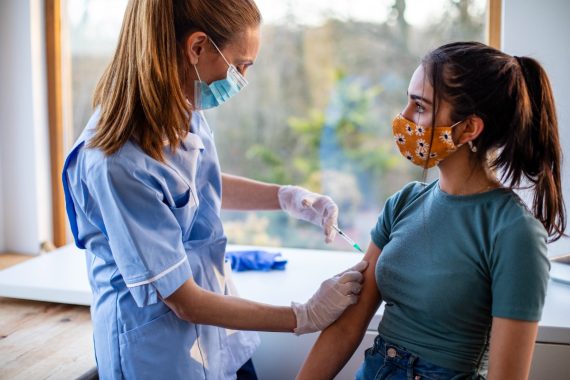Vaccination may lessen existing long Covid symptoms, ONS analysis suggests

Vaccination may help lessen the symptoms of long Covid in those who already have it, research from the Office for National Statistics suggests.
An analysis of data from 28,356 adults aged 18-69 years who had received at least one Covid-19 vaccine after testing positive for SARS-CoV-2 infection showed that 24% reported long Covid symptoms of any severity over a seven-month period.
A first vaccine dose was linked with an initial 13% decrease in the odds of long Covid, although the data could not show whether this was sustained between jabs.
The second vaccine dose was associated with a further 9% decrease in the risk of long Covid, which lasted over an average follow-up of nine weeks, the researchers reported in the BMJ.
Before vaccination was introduced, the odds of long Covid symptoms had not changed over time, they added.
The pattern remained when the researchers also looked only at long Covid severe enough to limit a person’s day-to-day activities.
Taking account of sociodemographic characteristics, health related factors, vaccine type, or duration from infection to vaccination also made no difference to the findings, the ONS researchers reported.
While stressing it was an observational study so could not prove causality and longer follow up was needed, they concluded that the results added to the existing evidence that vaccination may have an impact on improving long Covid symptoms at the population level.
‘We found that vaccination against Covid-19 is associated with a decrease in the likelihood of continuing to experience long covid symptoms in adults aged 18 to 69 years, and this appeared to be sustained after a second vaccine dose,’ they said.
Theories that have been suggested for why vaccination may improve long Covid symptoms include that it prompts an immune system ‘reset’ and help fight off any residual viral reservoir, but more research is needed to understand the biological mechanism and how long it might last, they said.
‘Further research is required to evaluate the long-term relationship between vaccination and long covid, in particular the impact of the Omicron variant, which has become dominant in the UK, booster doses, now widely available to adults in the population, and reinfections,’ they added.
Dr Peter English, past chair of the BMA Public Health Medicine Committee, said long Covid likely describes a number of different conditions that happen after infection with different causes.
‘Even if vaccination can prevent or reduce the incidence or severity of some of these conditions, it may not prevent all of them.’
He added: ‘The large scale of this study means that we can be fairly confident about what has been observed; but it does not mean we can be sure what it means.
‘The most obvious – and perhaps the most likely inference – is that vaccination does, indeed, prevent at least some cases of long Covid, and may even reduce the severity of symptoms or even “cure” long Covid.
‘But, while we can hope that vaccination will help, we cannot yet say this with any confidence.’
Dr Peter English, past chair of the BMA Public Health Medicine Committee, said long Covid likely describes a number of different conditions that happen after infection with different causes but that the research added to other studies with similar findings.
‘Even if vaccination can prevent or reduce the incidence or severity of some of these conditions, it may not prevent all of them.’
He added: ‘The large scale of this study means that we can be fairly confident about what has been observed; but it does not mean we can be sure what it means.
‘The most obvious – and perhaps the most likely inference – is that vaccination does, indeed, prevent at least some cases of long Covid, and may even reduce the severity of symptoms or even “cure” long Covid.
‘But, while we can hope that vaccination will help, we cannot yet say this with any confidence.’
Pulse October survey
Take our July 2025 survey to potentially win £1.000 worth of tokens

Visit Pulse Reference for details on 140 symptoms, including easily searchable symptoms and categories, offering you a free platform to check symptoms and receive potential diagnoses during consultations.
Related Articles
READERS' COMMENTS [1]
Please note, only GPs are permitted to add comments to articles











If this is true, rather than due to various study biases or the interference of other side effects, or just passage of time, (and I note that the authors have no confidence in the result until further study can be done) – THEN we urgently need to research new vaccines with greater efficacy and a MUCH IMPROVED SIDE EFFECT PROFILE, and that can be used at low cost in all global countries!